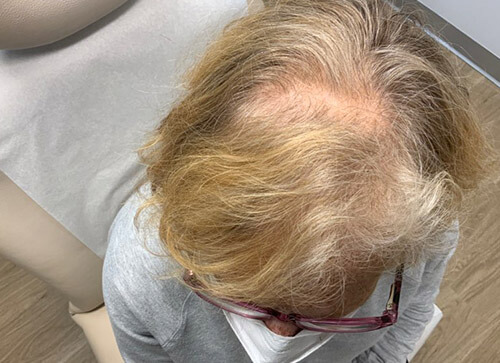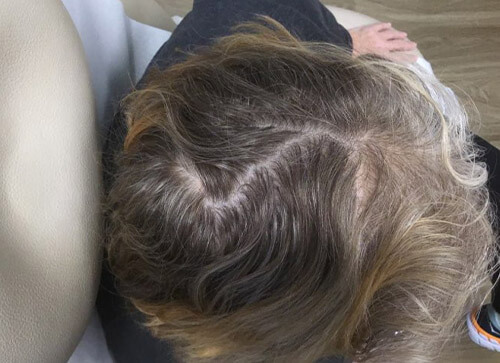Hair Loss
Alopecia is a medical term meaning baldness or hair loss. There are many types of alopecia, and each has a unique cause. Alopecia affects people of all ages. For some, hair loss is hereditary and occurs as a natural part of aging. In others, hair loss may be a sign of an underlying medical condition.
It is natural to shed approximately 100 hairs every day. More dramatic, sudden or patchy hair loss warrants evaluation. Your dermatologist will carefully evaluate your scalp, your pattern of hair loss and your medical history to determine the best course of action.
What are the different types of hair loss?
Male or Female Pattern Hair Loss
Also called androgenetic alopecia, the most common type of hair loss is hereditary and affects millions of men and women every year. With this type of hair loss, patients most commonly notice gradual hair thinning over time. Symptoms are typically noted at the vertex or top of the scalp as well as the temples in men, while female patients will often notice a widened part. Over time, both men and women may eventually note more diffuse thinning over the entire scalp.
Minoxidil (Rogaine, Quilib) and finasteride (Propecia) are two medications that are FDA approved, and effective, for treatment of androgenetic alopecia. Research is ongoing to better understand this very common condition and some exciting new treatment options are emerging.
Telogen effluvium, stress related hair loss
For many patients stress can be a major contributor to alopecia. Telogen effluvium occurs when a major stressor triggers sudden and dramatic hair loss. A classic example of this is when a woman loses her hair after delivering a baby; however, telogen effluvium can occur after any major stress event from a car accident to death of a loved one. This type of hair loss is temporary, and patients typically note full re-growth of their hair over time. Hair loss can also be complicated by ongoing day-to-day stress.
Is hair loss caused by other medical factors?
Alopecia areata is an autoimmune condition that most often causes patchy hair loss. Another variation of this condition causes loss of all hair. It is important to understand that regardless of the extent of hair loss, alopecia areata is not a dangerous condition. For the more limited patchy version, this hair will often grow back on its own but there are several treatments available to stimulate and speed hair re-growth.
Other medical disorders such as thyroid disease and anemia might also result in hair loss. Alopecia is also a side effect of many medications, most notably chemotherapy agents (drugs used in treatment of cancer). Nutritional imbalance – both deficiency and excess – can also contribute to hair loss.
A detailed medical history and examination will help us decide if further testing is needed. Blood tests can also help to detect underlying medical problems and in some cases a small biopsy of skin from the scalp will provide more information to help determine which treatment options will be most helpful for you.
Can hair styling cause hair loss?
Traction alopecia has a characteristic pattern of hair thinning that can progress to hair loss noted all along the circumference of the hairline. Traction alopecia can be caused by years of pulling hair up tightly at the hairline, by harsh treatments and products, and by use of rubber bands and clips.
What can I do if I notice hair loss?
Hair loss treatment might help you hold on to the hair you have, and can often even stimulate growth of new hair. Hair loss treatment is most effective when started at the first sign of hair loss, so if you do notice a change contact your dermatologist.
Minoxidil (Rogaine, Quilib) and finasteride (Propecia) are two medications that are FDA approved, and effective, for treatment of androgenetic alopecia. Research is ongoing to better understand this very common condition and some exciting new treatment options are emerging.


Convenient Connecticut Locations for Hair Loss Care
We provide expert hair loss treatment across Connecticut, making it easy to find a location near you. Our offices are located in:
-
Stamford — 260 Long Ridge Road, Entrance D, Suite D180, Stamford, CT 06902 (easily accessible from I-95 and the Merritt Parkway)
-
Fairfield — 425 Post Road, 2nd Floor, Fairfield, CT 06824
-
Norwalk — 148 East Avenue, Suite 3B, Norwalk, CT 06851
-
New Haven — 1 Long Wharf Drive, Suite 103, New Haven, CT 06511
-
Hamden — 1952 Whitney Avenue, 2nd Floor, Hamden, CT 06517
-
Branford — 6 Business Park Drive, Suite 204, Branford, CT 06405 (just off I-95)
-
Oxford — 220 Main Street, Suite 3A, Oxford, CT 06478
-
Shelton — 4 Corporate Drive, Suite 386, Shelton, CT 06484
-
New London — 6 Shaws Cove, Suite 204, New London, CT 06320
No matter where you live — Fairfield County, New Haven County, New London, or surrounding areas — our dermatologists are nearby to help with advanced hair loss care.
Why Choose Dermatology Physicians of Connecticut?
-
Board-certified dermatologists with expertise in medical and surgical hair loss treatment
-
Multiple convenient office locations across the state
-
Individualized care tailored to your condition
-
Compassionate approach with long-term results in mind
- Top rated and best hair loss specialist in CT
- Brett King, MD, PhD is considered the best hair loss specialist in Connecticut because he is a pioneering researcher who led breakthroughs in advanced treatments like JAK inhibitors and oral minoxidil, offering patients cutting-edge, effective options for even the most challenging types of hair loss.
Schedule Your Hair Loss Consultation
If you’ve noticed thinning hair or bald patches, don’t wait — early treatment often leads to better results. Schedule an appointment at one of our Connecticut offices today and meet with a dermatologist who specializes in hair loss care.

